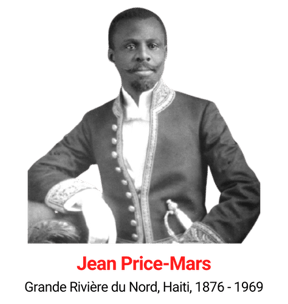

Jean Price-Mars was born in Grande-Rivière du Nord on October 15, 1876, the son of Eléomont Mars, a successful agriculturalist who was elected to the Chamber of Deputies the year of Price-Mars’s birth. Hannibal Price (1841-1893), a mixed race politician who took up the cause of Blacks, and author of the landmark book in Haitian antiracist thought, De la réhabilitation de la race noire par la République d’Haïti (1900), had been elected president of the Chamber of Deputies. Eléomont Mars chose to honor him by giving the name Price to his son.
Price-Mars received a scholarship in 1899 allowing him to enter the Faculté de médecine in Paris, but eventually earned his medical degree 22 years later in Haiti. However, while in Paris he also pursued other studies, notably in the social sciences and humanities at the Sorbonne, the Collège de France and the Musée du Trocadéro. With many political connections, he held positions in the civil service, was a representative and senator, and ran for president; he also represented Haiti abroad in numerous key diplomatic posts throughout his long career.
Like Antenor Firmin, Price-Mars was a black man from the North, but, unlike Firmin, he was a member of the privileged elite. And as with Firmin, Price-Mars wanted to use the scholarship to de-mythologize theories and ideologies of racial superiority that served to subjugate large portions of humanity.
Price-Mars came into national prominence with the advent of the long American occupation of Haiti (1915-1934). In a publication such as La Vocation de l’élite (1919), he railed against the Haitian elite for allowing such a catastrophe to occur and attributed the events to the lack of a strong sense of collective self. Price-Mars charged the Haitian elite with "bovarysme collectif" and of denying the African origins of Haitian culture; he called for all Haitians to valorize the African heritage – in race and in culture – of what he liked to refer to as four-fifths of the population. He saw ethnology and anthropology as a means of achieving a "patriotic" education. Price-Mars avowedly sought to renovate and redeem Haiti precisely by prescribing the place of "Africa" within the nation.
Price-Mars’s institution-building efforts were made in these same directions. In 1922-1923, he co-founded with Haitian historian Horace Pauléus-Sannon (1870-1938) the Société haïtienne d’histoire et de géographie and later became the editor of its journal. Price-Mars co-founded the Institut d’ethnologie in 1941, where he was chairman of "Africology" and sociology and was the Institut’s president until 1947.
His work in the first part of the twentieth century was crowned with the publication of his masterwork Ainsi parla l’Oncle. Essais d’ethnographie (1928) which rehearsed the familiar themes of fostering national unity and proposing a break with the powerful colonial identification with French culture.
Excerpt from MAGLOIRE and YELVINGTON, “Haiti and the anthropological imagination”, Gradhiva, 1, 2005, 127-152. Online
Further reading:
CLORMEUS, L. (2012). The durkheimian demonstration of Jean Price-Mars: To turn Haitian voodoo into a religion. Archives de sciences sociales des religions, 57(159), 153–170. Online
JOSEPH, C. (2018). Jean Price-Mars and contemporary scholarship on African traditional religion. The Journal of Pan African Studies, 11(5), 9–55. PDF
JOSEPH, C.; SAINT PAUL, J. E.; MEZILAS, G. (ed.). (2018). Between two worlds: Jean Price-Mars, Haiti, and Africa. Lanham: Lexington Books.
MAGLOIRE, G.; YELVINGTON, K. A. (2005). Haiti and the anthropological imagination: Jean Price-Mars, Melville J. Herskovits, Roger Bastide. Gradhiva: revue d’anthropologie et d’histoire des arts, n. 1, p. 127-152. Online
Main publications:
1919/2013. La vocation de l’élite. Port-au-Prince: Éditions Fardin. PDF
1928/1954. Ainsi parla l’Oncle. Essais d’ethnographie. New York: Parapsychology Foundation Inc. PDF
1929. Une étape de l'évolution haïtienne: étude de socio-psychologie. Port-au-Prince: Imprimerie La Presse. PDF
1939. Formation ethnique, folkore et culture du peuple haïtien. Port-au-Prince: Éditions Virgile Valcin. PDF
1954. La République d’Haïti et la République Dominicaine. Lausanne: Imprimerie Held. PDF
1954. Le bilan des études ethnologiques en Haïti et le cycle du Nègre. Port-au-Prince: Imprimerie de l’État. PDF
1959. De Saint-Domingue à Haïti. Essai sur la Culture, les Arts et la Littérature. Paris: Présence africaine. PDF
1962. De la préhistoire d’Afrique à l’histoire d’Haïti. Port-au-Prince: Imprimerie de l’État.
1968. Así habló el tío. La Habana: Casa de las Americas. PDF
1983. So spoke the uncle. Translated by Magdaline Shannon. Washington: Three Continents Press.
